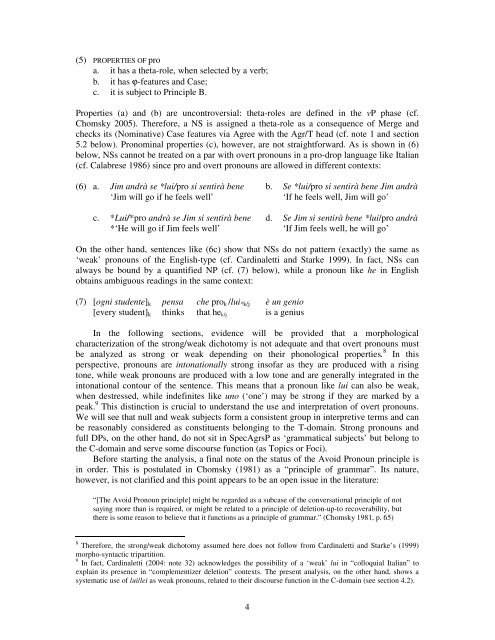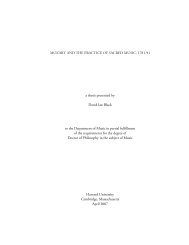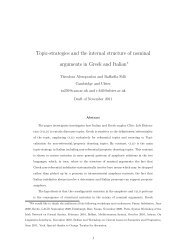Subjects, Topics and the Interpretation of Referential pro.
Subjects, Topics and the Interpretation of Referential pro.
Subjects, Topics and the Interpretation of Referential pro.
You also want an ePaper? Increase the reach of your titles
YUMPU automatically turns print PDFs into web optimized ePapers that Google loves.
(5) PROPERTIES OF <strong>pro</strong><br />
a. it has a <strong>the</strong>ta-role, when selected by a verb;<br />
b. it has ϕ-features <strong>and</strong> Case;<br />
c. it is subject to Principle B.<br />
Properties (a) <strong>and</strong> (b) are uncontroversial: <strong>the</strong>ta-roles are defined in <strong>the</strong> vP phase (cf.<br />
Chomsky 2005). Therefore, a NS is assigned a <strong>the</strong>ta-role as a consequence <strong>of</strong> Merge <strong>and</strong><br />
checks its (Nominative) Case features via Agree with <strong>the</strong> Agr/T head (cf. note 1 <strong>and</strong> section<br />
5.2 below). Pronominal <strong>pro</strong>perties (c), however, are not straightforward. As is shown in (6)<br />
below, NSs cannot be treated on a par with overt <strong>pro</strong>nouns in a <strong>pro</strong>-drop language like Italian<br />
(cf. Calabrese 1986) since <strong>pro</strong> <strong>and</strong> overt <strong>pro</strong>nouns are allowed in different contexts:<br />
(6) a. Jim <strong>and</strong>rà se *lui/<strong>pro</strong> si sentirà bene b. Se *lui/<strong>pro</strong> si sentirà bene Jim <strong>and</strong>rà<br />
‘Jim will go if he feels well’ ‘If he feels well, Jim will go’<br />
c. *Lui/*<strong>pro</strong> <strong>and</strong>rà se Jim si sentirà bene d. Se Jim si sentirà bene *lui/<strong>pro</strong> <strong>and</strong>rà<br />
*‘He will go if Jim feels well’ ‘If Jim feels well, he will go’<br />
On <strong>the</strong> o<strong>the</strong>r h<strong>and</strong>, sentences like (6c) show that NSs do not pattern (exactly) <strong>the</strong> same as<br />
‘weak’ <strong>pro</strong>nouns <strong>of</strong> <strong>the</strong> English-type (cf. Cardinaletti <strong>and</strong> Starke 1999). In fact, NSs can<br />
always be bound by a quantified NP (cf. (7) below), while a <strong>pro</strong>noun like he in English<br />
obtains ambiguous readings in <strong>the</strong> same context:<br />
(7) [ogni studente]k pensa che <strong>pro</strong>k /lui*k/j è un genio<br />
[every student]k thinks that hek/j is a genius<br />
In <strong>the</strong> following sections, evidence will be <strong>pro</strong>vided that a morphological<br />
characterization <strong>of</strong> <strong>the</strong> strong/weak dichotomy is not adequate <strong>and</strong> that overt <strong>pro</strong>nouns must<br />
be analyzed as strong or weak depending on <strong>the</strong>ir phonological <strong>pro</strong>perties. 8 In this<br />
perspective, <strong>pro</strong>nouns are intonationally strong ins<strong>of</strong>ar as <strong>the</strong>y are <strong>pro</strong>duced with a rising<br />
tone, while weak <strong>pro</strong>nouns are <strong>pro</strong>duced with a low tone <strong>and</strong> are generally integrated in <strong>the</strong><br />
intonational contour <strong>of</strong> <strong>the</strong> sentence. This means that a <strong>pro</strong>noun like lui can also be weak,<br />
when destressed, while indefinites like uno (‘one’) may be strong if <strong>the</strong>y are marked by a<br />
peak. 9 This distinction is crucial to underst<strong>and</strong> <strong>the</strong> use <strong>and</strong> interpretation <strong>of</strong> overt <strong>pro</strong>nouns.<br />
We will see that null <strong>and</strong> weak subjects form a consistent group in interpretive terms <strong>and</strong> can<br />
be reasonably considered as constituents belonging to <strong>the</strong> T-domain. Strong <strong>pro</strong>nouns <strong>and</strong><br />
full DPs, on <strong>the</strong> o<strong>the</strong>r h<strong>and</strong>, do not sit in SpecAgrsP as ‘grammatical subjects’ but belong to<br />
<strong>the</strong> C-domain <strong>and</strong> serve some discourse function (as <strong>Topics</strong> or Foci).<br />
Before starting <strong>the</strong> analysis, a final note on <strong>the</strong> status <strong>of</strong> <strong>the</strong> Avoid Pronoun principle is<br />
in order. This is postulated in Chomsky (1981) as a “principle <strong>of</strong> grammar”. Its nature,<br />
however, is not clarified <strong>and</strong> this point appears to be an open issue in <strong>the</strong> literature:<br />
“[The Avoid Pronoun principle] might be regarded as a subcase <strong>of</strong> <strong>the</strong> conversational principle <strong>of</strong> not<br />
saying more than is required, or might be related to a principle <strong>of</strong> deletion-up-to recoverability, but<br />
<strong>the</strong>re is some reason to believe that it functions as a principle <strong>of</strong> grammar.” (Chomsky 1981, p. 65)<br />
8<br />
Therefore, <strong>the</strong> strong/weak dichotomy assumed here does not follow from Cardinaletti <strong>and</strong> Starke’s (1999)<br />
morpho-syntactic tripartition.<br />
9<br />
In fact, Cardinaletti (2004: note 32) acknowledges <strong>the</strong> possibility <strong>of</strong> a ‘weak’ lui in “colloquial Italian” to<br />
explain its presence in “complementizer deletion” contexts. The present analysis, on <strong>the</strong> o<strong>the</strong>r h<strong>and</strong>, shows a<br />
systematic use <strong>of</strong> lui/lei as weak <strong>pro</strong>nouns, related to <strong>the</strong>ir discourse function in <strong>the</strong> C-domain (see section 4.2).<br />
4
















